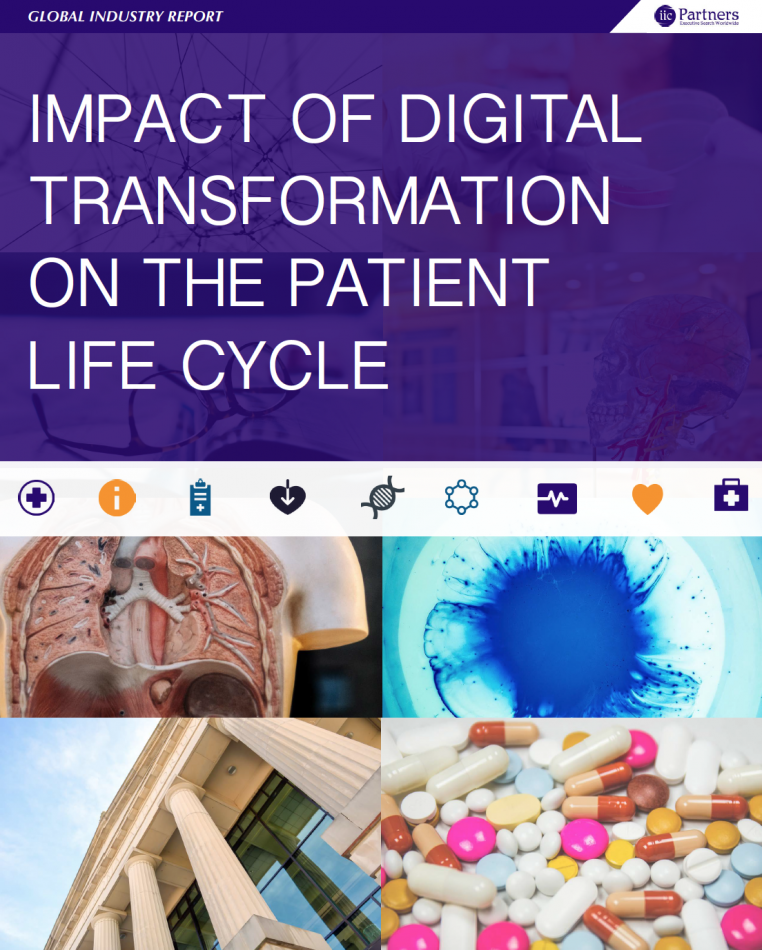Impact of Digital Transformation On The Patient Life Cycle
31 October 2017
IIC Partners Life Sciences & Healthcare Practice interviewed 11 senior executives and thought leaders in the industry on the impact digital transformation is having on the patient care life cycle and leadership teams. These interviews represent global perspectives from organisations including major hospitals, digital healthcare innovators, healthcare groups, integrated health systems and more. Below is a summary of the key trends and emerging leadership roles. The full commentary from each interview session is included within this report.
Patients Take Ownership Of Health Data
A large challenge for the healthcare industry is the incompatibility between different Electronic Medical Record Systems (EMRs) across businesses. This prohibits transparency, collaboration and the easy exchange of patient data to provide accurate and complete care. According to several healthcare experts, a shift is occuring to empower patients to take ownership of their data providing them with access to their complete medical records when interacting with any healthcare provider. This ownership minimizes gaps in patient care and health coverage while reducing cost, duplication of treatments and tests and strain on industry resources. A proposed long-term strategy is for every patient to carry his or her data in the cloud that is protected and accessible by a patient’s biometrics. By patients owning their health data, it provides them more control and involvement in their own care.
Population Health Initiatives Are A Growth Area
A growth area within healthcare and life sciences is the development of population health initiatives. These pilot programs enable caregivers and organisations to identify segments of patient populations and their associated risk levels through the use of big data and predictive analytics. This allows caregivers to provide more targeted and connected treatments for patients and the digitization of data makes outcomes smarter and faster over time. The more data that is collected, the more accurately doctors can proactively manage complexities across large segments of populations. Healthcare organisations are investing in these initiatives by appointing Population Health Physician Liaison roles and Informatics Committees to better align Physicians and information.
New Technologies Are Demanding New Skillsets
As new technologies become available, the integration of connected healthcare devices and assets is critical to gathering and storing data. New digital equipment will require additional technology skillsets for caregivers to maintain and upgrade these tools, train healthcare workers on their use and integrate them into the operations of hospitals and other clinical centers. This reduces the strain on IT support, while the deployment of cloud technologies create less reliance for on-site IT personnel. Healthcare organisations will need smart data scientists to analyze data sets to identify patterns and recommend new and different parameters to measure. Productivity and efficiency increases when the right machines are connected to the right networks and operated by highly skilled and trained individuals.
Big Data Key To Driving Telehealth Programs
Several thought leaders cite telehealth and telemedicine as a rapidly rising sector for healthcare and life sciences companies. As telemedicine and delivering care in a patient’s “lifespace” continues to grow, it will serve as a more strategic function. Companies will need to consider the leadership roles necessary to support this initiative. Virtual visits by physicians allow for patients to selfreport symptoms, recieve in-home chemotherapy treatments and receive care in remote areas where access to healthcare is limited. As the level of interactivity between patient and caregiver rises, the boundary between EMRs and patient portals blur, requiring more robust and standardized integrations.
Culture Serves As Key To Transformation
Culture is a major challenge for digital transformation in healthcare and life sciences companies. Even if an organisation has robust systems in place, large-scale transformations for a global company will take time since cultural shifts cannot happen overnight. The rate of change at which new technologies are being developed is unprecedented. This places enormous stress on organisations and caregivers. One shared challenge is convincing and training caregivers to regularly use digital tools in their daily practice. Physicians and caregivers are overloaded and their attention is diverted by many other aspects daily. It is critical to persuade these internal stakeholders that electronic documentation is also a form of caregiving. The value of these efforts will be demonstrated by providing concrete support and insights in daily practice through predictive analytics, closing the care gap and involving patients more in their own healthcare. As digital tools become available, new challenges arise surrounding critical thinking skills and an inherent dependence on technology. Human error is a very real threat to protocols and systems supplemented by technology. Healthcare givers must continue to exercise critical thinking to uncover any errors which can result in false postives and possible malpractice.
7 RISING LEADERSHIP DEMANDS IN HEALTHCARE AND LIFE SCIENCES
Chief Digital Officer (CDO)
Digital transformation creates an entirely new seat at the executive table that goes beyond a traditional Chief Information Officer role. The Chief Digital Officer (CDO) has oversight of operational technology (OT) including physical machines and the people needed to operate them. The CDO must have a team that can look at a system end-to-end, and make decisions in real-time, using valuable data that is collected.
Chief Medical Information Officer (CMIO)
The role of the CMIO is to bridge the gap that separates physicians and care givers from hospital IT staff and to collaborate with both groups to specify, maintain and evolve healthcare related information technologies. The CMIO requires strong communication skills, an element of empathy for users, and a strong sense of ethics and responsibility.
Population Health Liaison
The Population Health Liaison aims to align physicians with information and data to better manage community health. By building data models and leveraging teams and tools, companies can transition from a retrospective caregiving mindset to a more predictive analytical and proactive approach to patient care. In addition, the Population Health Liaison can deliver a comprehensive and in-depth knowledge of the entire health journey of a patient.
Data Protection Officer
As GDPR approaches in 2018, healthcare organisations will need to re-examine cyber security practices and protocols placing stress on IT departments. This leader will become an essential partner to mitigate the risks of cyber-attacks, properly obtain consent from patients to store personal information and ensure regulatory compliance.
B2B Relationship Builders
Digital transformation has demanded transparency between healthcare and life sciences organisations across the globe. Without one unified Electronic Medical Record System, healthcare organisations must build strong partnerships with other key industry players to promote collaboration. This role removes existing barriers between healthcare providers, insurance, innovators and more.
Chief Performance Officer
The Chief Performance Officer is responsible for bringing together system-wide services and teams such as enterprise intelligence, quality and operational performance management. By optimizing systematic operations and processes, companies can benefit from consistent reporting stuctures, concrete analytical findings and shared information.
Data Scientist
Often reporting to the Chief Digital Officer (CDO) or Chief Medical Information Officer (CMIO), Data Scientists mine data from health records and connected assets. These analytics provide actionable insights for the business, caregivers and health departments resulting in a more proactive approach to patient care and truly maximizing the amount of data collected.
Interviews were conducted by IIC Partners Life Sciences and Healthcare Practice members including: de JAGER Executive Search in Sydney, Envision Partnership in Dubai, Furst Group in Chicago, Hoffman & Associates in Brussels, Holtrop Ravesloot in Amsterdam, JFP Executive Search in Helsinki, MERC Partners in Dublin and Salveson Stetson Group in Philadelphia. The following comments and quotations are paraphrased from prior interviews.
Click here to download the full Industry Report.
Industry Report: The Impact Of Digital Transformation On The Patient Life Cycle
IIC Partners Life Sciences & Healthcare Practice interviewed 11 senior executives and thought leaders in the industry on the impact digital transformation is having on the patient care life cycle and leadership teams. These interviews represent global perspectives from organisations including major hospitals, digital healthcare…





